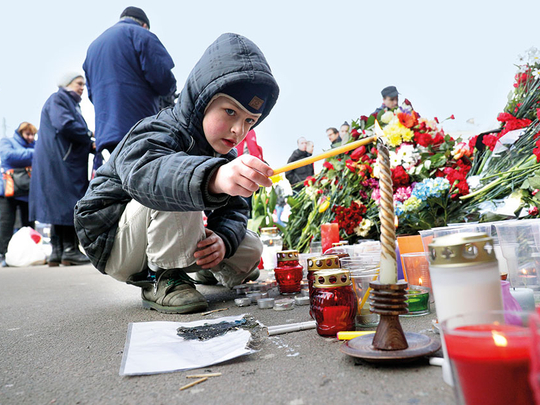
SAINT PETERSBURG: Gently placing flowers outside a Saint Petersburg metro station to honour the 14 people killed in Monday’s devastating suicide bombing, Ksenia Zashikhina ponders what might have been.
“I was going to take the metro a few minutes before the explosion,” said the 27-year-old, her voice cracking with emotion.
“I don’t know why but I changed my mind and went on foot. I found out what had happened on the way. All day, I was thinking that that could have been me,” she told AFP.
Alongside her, a sparse crowd of residents from Russia’s second city came to pay their respects, adding bouquets and candles to the rapidly growing impromptu memorial.
One man, Nikolai Kazachenko, was clearly in shock, his eyes red from sobbing and cradled from time to time by his wife.
He endlessly repeated to anyone who would listen how “God saved me” from the blast that claimed 14 lives and caused horrific injuries to dozens more.
His friend was also in the metro and also survived.
Mixed with the grief was a sense of shock that terror could strike their city that had seemed far from being a target — unlike Paris, Berlin or London.
Even threats to Moscow “seemed far away from us,” said Dmitry Leonov as he picked his way through the candles and flower tributes lining the gates of the station.
“Now we’re all under threat,” he said.
Another resident, who gave his name as Arseny, said: “I don’t understand it. We’re all living together in a beautiful country, in a beautiful city. How could anyone do such a thing?”
However, for others, the pain and grief is still raw. One woman screamed that she still had no news from her son and berated politicians one by one until she was dragged by a friend from the crowd in floods of furious tears.
Meanwhile, life was gradually returning to normal in the city as boulevards that had been silent and blocked off in the aftermath of the attack on Monday again rang out with the noise of traffic and the honking of horns.
The metro system, which carries hundreds of thousands of passengers daily and is seen as the lifeblood of the city, was also creeping gradually back to life — although with a heavy police presence and a nervousness running through the commuters.
“Everyone in the metro can only think of this,” said 45-year-old Svetlana Golubeva, 45.
“It’s not nice but I’m mainly scared for my children when they take the metro on their own.”
Saint Petersburg is also the hometown of President Vladimir Putin, who came himself to mourn late Monday and place his own flowers at the scene.
Just before the president’s arrival, police politely but firmly pushed back a group of young men who had come to offer their services for the clean-up operation.
One of them, Nikolai, 33, made no secret of the fact that he had been drinking for most of the day to dull the pain.
Although there has yet been no claims of responsibility, Nikolai was in no doubt, blaming the president’s “tolerance” towards “Islamists”.
“I’m angry at our own country. We can’t protect ourselves from terrorists,” complained Ilya, a friend of Nikolai’s, before laying her own tribute to the 14 dead.












